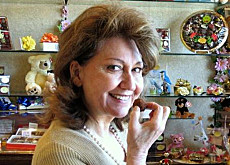Canada’s Swiss – to vote or not to vote

If Swiss expatriates are proud of their heritage, why does only one in every six exercise his or her right to vote? Three Swiss in Canada explain their reasons.
One imports fresh cream-filled chocolate truffles from Switzerland, another is a politically active fundraiser and the third is carrying on the Swiss dairy farming tradition.
They all live in the greater Toronto area, the capital of Ontario which is Canada’s most populous province and the country’s economic powerhouse. Of the SFr2.4 billion (CAD 2.1 billion) in Swiss exports to Canada in 2005, 70 per cent went to Ontario.
It is not surprising than that this central province wedged between the Great Lakes also “imports” large numbers of Swiss expatriates. Nearly one in three of Canada’s 36,000 Swiss passport holders lives in Ontario, and nearly half of these call the Toronto area home.
One of the top addresses is owned by Ingrid Läderach-Steven, a woman from central Switzerland who has become somewhat of a Toronto institution. She sells “beautiful chocolates for beautiful people” from her shop, Swiss Master Chocolatier, in the upscale Bridle Path neighbourhood.
The Canadian media have published and broadcast numerous reports about the shop, often asking Läderach-Steven for sweet tips at Easter and Christmas.
But even though she has become a minor Canadian celebrity, the woman who left her home country about 30 years ago remains Swiss at heart.
She moves in Toronto’s Swiss circles, sponsoring events organised by the local Swiss club as well as taking part in their activities. However, she draws the line when it comes to exercising her right to vote in Switzerland.
“I love my homeland and as much as I am interested in what goes on there, I don’t feel it is fair for me – after having been away for over 30 years – to contribute to what is happening in the country,” Läderach-Steven says.
Seductive
Her train of thought is interrupted time and again by people entering the tiny shop. She aims her seductive smile at the customers, gives advice, lovingly gift wraps small boxes of chocolate and concludes each sale as one would a friendship. It’s her secret to success.
“There are some things I feel we should not have the right to anymore once we leave the country, [especially] when it comes to domestic issues,” she adds.
Vreni Ducommun does not agree. The retired teacher lives with her Swiss husband only a few blocks from the chocolate shop. She has voted in Swiss elections and in referenda since that was made possible in 1992 and was a delegate for Canada on the Council of the Swiss Abroad for eight years.
“We can contribute. Our experience in another country makes us look at the bigger picture.” She says her husband pays royalties for a Swiss licence in civil engineering technology and over the years their company has employed several Swiss people.
“We are good ambassadors – as we are called – for Switzerland. It’s to our mutual benefit that we stay connected and involved.”
Ironically, Ducommun gained her first voting experience in Canada since she moved there in 1968, three years before women’s suffrage was introduced in Switzerland.
She says that gave her an appreciation for the right. It led her to become politically active in Canada, joining a group which helped enshrine women’s rights in the Canadian constitution, and participating in elections to school boards. And she raises funds for Canadian cultural institutions.
Switzerland’s benefit
She has passed on her passion to her grown daughter. Discussing Swiss political issues has brought mother and daughter closer together, Ducommun says.
But her challenge and that of the Swiss club to which she belongs is to convince other second-generation Swiss of the importance to vote in a country they only know from the occasional holiday trip.
Like Roland Egger.
Egger is in the process of taking over the farm of his parents who came to Ontario from canton St Gallen in the early 1950s with only a few dollars in their pockets.
Like many Swiss farms in Canada, the Egger property located on the crest of an escarpment southwest of Toronto is a neat and tidy model of perfection. Egger’s father converted what was a swamp into a dairy operation with 52 head of cattle and idyllic trout-filled ponds.
“I would reconsider [voting] but before I pursue it I would have to know more,” the young Egger says. “Basically asking me to vote would be asking who do you think will win, this person or that person, and I don’t know anything about it. I don’t see it as a concern of mine.”
Visitors from Switzerland keep Egger informed of changes to Swiss agriculture policy which he is keen to hear.
“The issues are always interesting and it’s important to stay up to date but it’s not as important as being able to visit because we have ties there and numerous places to stay. That’s the main reason [we stay in touch with the country].”
swissinfo, Dale Bechtel in Toronto
Swiss immigrants began arriving in Ontario in the late 18th century. Many of the early Swiss settlers were members of the Mennonite religious movement, which originated in Switzerland but was suppressed there.
A larger wave of Swiss came in the years immediately after the end of the Second World War, attracted by Canada’s fast-growing economy.
The 11,500 Swiss living in Ontario are part of the larger community of 36,000 Swiss passport holders in Canada. It is the largest number after the United States, and fifth biggest Swiss community in the world.

In compliance with the JTI standards
More: SWI swissinfo.ch certified by the Journalism Trust Initiative










You can find an overview of ongoing debates with our journalists here . Please join us!
If you want to start a conversation about a topic raised in this article or want to report factual errors, email us at english@swissinfo.ch.